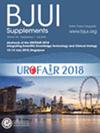Perspectives on technology: All STEPS count – an integrated framework for net zero urological care
Abstract
Objective
To present a narrative review of evidence to guide the delivery of high-quality, low-carbon urological care using a structured framework.
Methods
Academic and policy papers which outline actions focused on decarbonising urological care and surgical care more broadly were identified and reviewed. The ‘STEPS to Low-Carbon Care’ framework (an acronym for low-carbon care across ‘Settings and Treatments, Efficiency, Prevention and System change’) was then used to categorise and present the evidence-based decarbonisation actions, using the National Health Service in England as a case study.
Results
Across all STEPS framework elements, tangible actions were identified alongside opportunities for future research and innovation. The evidence-based actions that were identified to transition to low-carbon care settings and treatments included tackling known carbon hotspots in operating theatres: anaesthetic gases, consumables and electricity use. Outside the operating theatre, urology pathway transformation through one-stop clinics, day-case surgery, appropriate use of virtual appointments and streamlined pathways demonstrated opportunities to reduce carbon emissions, with potential additional benefits in terms of cost, efficiencies, and patient outcome improvements. Key climate mitigation actions that support keeping people healthy were identified. There was a paucity of evidence demonstrating the implementation of climate change action as part of routine service delivery. Embedding sustainability across organisational processes and ways of working requires actions to upskill, engage and enable the workforce to deliver and to establish clinical leadership.
Conclusion
This review identified a range of interventions to decarbonise urological care, whilst highlighting a need for further research. Categorising the evidence according to components of the STEPS framework indicated the potential utility of this framework when determining unrealised decarbonisation opportunities in urology and more widely across healthcare. Delivering sustained and system-wide low-carbon urological care will require the collective action of all who design, deliver and influence patient care across the specialty and all urology patient pathways.


 求助内容:
求助内容: 应助结果提醒方式:
应助结果提醒方式:


